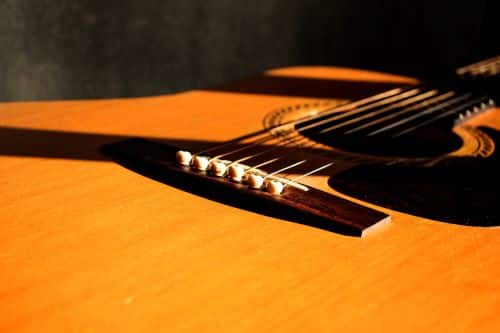Do Guitar Bridge Pins Make A Difference in Sound?
Although they are often overlooked or even underrated by many acoustic guitar players, guitar bridge pins play a very important role in the overall functioning of an acoustic guitar. More like your pinky finger or tiniest toe, a guitar without a bridge pin can hardly function, so it is important for any guitar player to fully understand what the bridge pin does and how the bridge affects the sound and functionality of an acoustic guitar.
What is the primary function of the bridge pin?
If you have ever changed the string of an acoustic guitar before, the answer to this question would be a rather simple one for you. The job of the bridge pin is to simply secure an acoustic guitar’s strings against the guitar’s bridge plate. Guitar bridge pins perform this task by simply holding each guitar’s string ball end against the guitar’s bridge plate. The guitar string curves around, enters through your bridge, and finally runs over the bridge saddle. By doing this, the bridge pin secures the guitar strings and ensures smooth playing.
Are all bridge pins the same?
Although they may all look the same, guitar bridge pins are not always the same. They usually come in different sizes, shapes, and materials and each affects the guitar quite differently. Guitar bridge pins come in different materials like plastic, brass, wood, ivory, and bone. However, most guitar makers (especially big brands like Martin and Taylor) often use the same sizes of bridge pins on all of their guitars.
Do bridge pins change the tone of a guitar?
Although they may appear to be quite small to make any tonal change or alteration to an acoustic guitar, bridge pins do actually change the tone of an acoustic guitar. Typically, bridge pins affect the tone of a guitar by filtering out certain frequencies; this way, they have a huge effect on the overall frequency spectrum of your acoustic guitar.
Another way bridge pins alter your guitar tone is by affecting the overall volume and sustain of your guitar. Unarguably, volume and sustain are very important aspects of the sonic/tonal character of any musical instrument, including the acoustic guitar. Different bridge pin materials react differently to humidity and temperature and this, in turn, has a tremendous impact on guitar tone. For example, brass would react quite differently to humidity than wood.
Because the bridge is the most important point of sound wave transfer between the top of the guitar and tone-wood and the vibrating strings, it has a huge effect on the resultant sound of the acoustic guitar. This way, many luthiers regard it as one of the cheapest ways of upgrading or changing your guitar tone. The perfect bridge pin will improve the clarity, volume, and sustain of your acoustic guitar.
Because they alter and filter certain frequencies, some bridge pins will produce more treble and bass and thus give a more pleasing guitar sound when compared to other guitars with different bridge pins. When upgrading guitar bridge pins, it is important to know how different bridge pin materials will affect the overall tonal characteristics of your guitar. Let’s take a look at how different materials sound.
Brass
Among all pin types, brass is always the most durable of all, they will last way longer than wood, plastic, and bone. However, they have their unique tonal characteristics which you can guess. If your guitar is not sounding too muddy or bassy, brass might make your guitar sound a bit too bright and somewhat harsh. This makes it suitable for just some special kinds of guitars. So, before changing your pins to brass, take some time to listen and analyze if your guitar needs some more treble. Also, brass can be a bit expensive and often requires a skilled luthier to fit them properly.
Plastic
Most guitars will always come with plastic bridge pins. They are the most resistant to temperature fluctuations, which means they hardly go out of tune during shipping. However, they come with a downside which is that they bend and wear out rather too quickly, in comparison to other materials. Another downside is that they tend to sound “flat” and do not enhance your guitar sound in any way. For these reasons, many players always choose to upgrade from plastic to other materials.
Wood
Wood bridge pins look great and will definitely improve your guitar tone. However, they tend to swell when exposed to moisture, which makes them less durable than other materials. Also, they tend to crack the bridges of vintage guitars.
Bone
For most guitar players, bone is always the best choice. They are more durable than plastic and wood, and they also tend to produce a brighter, warmer, and fuller acoustic guitar tone. However, they are a bit more expensive when compared to plastic.
Ivory
Beating all the other materials, ivory produces the best tone as they increase sustain, and gives more warmth and fullness to your guitar tone. Ivory just sounds pleasing, even to the untrained ears. But it comes with huge downsides. First, ivories can be very expensive, and they are also quite hard to legally obtain. For some ethical reasons, some people (especially animal rights activists and environmentalists) just stay off products made from ivory.
To hear the difference that these pins make on the sound of the guitar, watch this video:
Do brass bridge pins make a difference?
Technically, brass bridge pins reduce the tone of your guitar instead of enhancing it. What brass bridge pins do to your guitar is that they add additional mass to your guitar bridge. This extra mass hinders and limits the vibrating abilities of your guitar bridge. Brass bridge pins do not allow your guitar bridge to vibrate to its full extent. As a result, your guitar produces a sound that tends to have more treble. This is because the effect of this added mass is mostly felt in the higher frequencies.
The overall tonal effect of brass bridge pins on any guitar will be some extra crispness and harshness to the guitar tone. This is not exactly bad as this can be quite beneficial to guitars with excessive low end and boominess. This only means that brass bridge pins are not exactly good for all kinds of guitars. If you have a guitar that could make use of some extra brightness, harshness, or crispness, then you are better off with a brass bridge pin than any other type of bridge pin.
news via inbox
Sign up for the latest music news and entertainment!








